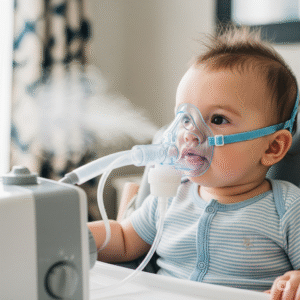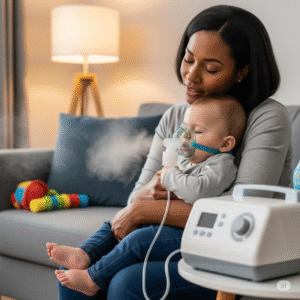As a parent, there are few things more stressful than seeing your little one struggling to breathe. That little wheeze or stuffy nose can feel like a mountain to climb. But what if there was a simple, effective way to help? Let’s talk about a powerful tool in your parenting toolkit: the nebulizer.

If you’ve heard the term “nebulize a baby,” you might have questions, especially if your baby is just a few weeks old. Is it safe? Is it even possible for such a tiny human? The answer is a resounding yes.
A nebulizer is a machine that turns liquid medication into a fine mist. Your baby simply breathes in this mist, and the medication goes directly to where it’s needed most: their lungs. This is a game-changer for treating common infant respiratory issues like bronchiolitis, asthma, or even just a severe cold that’s causing breathing difficulties.
Can I Use a Nebulizer on My 20-Day-Old Baby?
Absolutely. A baby’s age is not a barrier to using a nebulizer. In fact, for very young babies, this method is often preferred because they can’t use inhalers or other devices effectively. The key is to deliver the medicine in a way that is gentle and easy for them.
But here’s the most important rule of all: NEVER use a nebulizer on your baby without a doctor’s prescription and guidance.
A pediatrician is your best resource. They will diagnose your baby’s condition and prescribe the correct medication and dosage. What’s right for a 6-month-old is not necessarily right for a 20-day-old. Always follow their expert advice to ensure your baby’s safety and well-being.

Making the Nebulizer Experience Calming
Let’s face it, a noisy machine with a face mask can be a bit intimidating for a baby (and their parents!). The good news is, you can make this a positive, calming experience.
Here are a few tips to make nebulizer treatments go smoothly:
- Create a Soothing Atmosphere: Find a quiet, comfortable space. Try holding your baby in your lap, singing a lullaby, or playing some gentle music.
- Time it Right: Try to do the treatment when your baby is calm and not overly hungry or tired. A relaxed baby is more likely to accept the mask.
- Distraction is Your Friend: For a slightly older baby, a favorite toy or a simple story can work wonders. For a newborn, simply holding them close and talking in a soft voice is often enough.
- Gentle and Secure: Ensure the mask fits snugly but comfortably over their nose and mouth. There are special infant masks designed for this purpose.
A nebulizer is a powerful tool, but it’s one you should only use under the guidance of a healthcare professional. By working with your pediatrician and creating a calm, loving environment, you can help your little one breathe easier and get back to being their happy, healthy self.
Disclaimer: This blog post is for informational purposes only and does not constitute medical advice. Always consult with a qualified healthcare professional regarding any medical concerns or before making any decisions related to your health or the health of your child.
